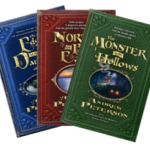Personal Predilections
As a rule, it is easy, when one dislikes a book, to see why. Obvious, even. So it was an interesting experience to get about three-quarters through Storm Siren and try to figure out why I was just waiting for the book to change. True, the section I had been reading was less than action-packed, but I have never needed action to be interested in a book. Those chapters of Storm Siren explored the characters and their world, all in beautifully written prose, and I felt I should have enjoyed it more than I did.
What dimmed my enjoyment, I finally decided, was the romance and angst, dosed out too generously for my tastes. I never doubted the novel’s craftsmanship, even when the content made me restless for something more. This left me thinking of something I realized some time ago: There is a difference between a good book and a book I liked.
We who judge books – as reviewers or simply as readers – need the discernment, and perhaps the humility, to  distinguish between honest judgment and our personal predilections. We all have our natural tastes, and it’s human to mistake our innate liking for an inherent superiority. But in fiction, as in everything, there are higher standards than our own tastes.
distinguish between honest judgment and our personal predilections. We all have our natural tastes, and it’s human to mistake our innate liking for an inherent superiority. But in fiction, as in everything, there are higher standards than our own tastes.
To know how well a book succeeds, we have to understand what it was meant to be. Once I read a historical novel about Jane Austen that was, at times, rather too slow, but I found it hard to fault the author. A novel like with that, with any fidelity to history, can involve only so much excitement. If the author had decided to write a novel in which Jane Austen was an undercover French spy during the Napoleonic Wars, and her works were actually written by Francis Bacon – well, that would have been more exciting. I might have even liked it more. But it would not have been a historical novel.
I take it for granted that many books have succeeded admirably in becoming the sort of thing I don’t like. I avoid those genres where I expect to find them. Even in the sort of books I enjoy, elements I dislike inevitably surface, and sometimes I criticize. But as time goes on, I realize more and more how subjective these things can be, and how vital the difference between subjective and objective criticism is.
A lack of logic in the plot, a lack of believability in the dialogue, a lack of motivation in the characters – these are objective criticisms, and come far nearer to the question of whether a book is good or bad. It’s only subjective to say that a book had too much romance; all that really means is that it had more romance than I liked. There is no objective measurement of how much is too much.
I don’t mean to discourage subjective criticism. It can be very interesting, and it’s especially useful in reviews; it helps people to determine if the book in question is something they would like. But it should be recognized for what it is, and given its proper weight. A book’s quality is not measured by how much it appeals to us personally.
This article was written for the CSFF blog tour of Storm Siren, for which I read and reviewed the novel, and it has been cross-posted to my blog.











































I agree completely. Here’s the the thing: I despise most romance stories, to the point that I’ve developed a blind spot to them. I tend to treat them like bumps in the road when you were a kid riding your bike: pop that wheelie, skim over that bit, and get back to the good stuff (so long as there is good stuff to get back to). Fortunately Storm Siren had plenty of other elements to enjoy. I tended to just skim through the “he’s so attractive” stuff.
But I do realize that these subplots are a big thing for a lot of the readership out there (including my sister). So I try to have respect for that fact that even if it’s not my cup of tea, that doesn’t me it’s without merit or makes the book “bad” (even if it may taint my enjoyment of the story). I will, however, object when I think the characterization is contrived or the story elements not built well. It’s why I focus so much on those sort of nuts/bolts of writing than “I love this book” in my reviews (unless I actually truly love it), since that’s easier for me to parse and hopefully help other potential readers.
PS: I tried to post this comment on your blog but got an error message.
So I try to have respect for that fact that even if it’s not my cup of tea, that doesn’t me it’s without merit or makes the book “bad” (even if it may taint my enjoyment of the story).
Exactly. I’ve come to understand this in my reading, and I judge more generously than I used to in this regard.
PS: I tried to post this comment on your blog but got an error message.
I found your comment in the spam folder and published it on my site. Thanks for posting it here, too.
Mmmm. I would say yes and no. I think that reviewing something low for personal reasons, while ignoring good points, is wrong. On the other hand, reviewing something lower due to matters of taste can be fine, so long as one admits it upfront and otherwise judges the book fairly.
I rated a manga lower a while back because (and I stated this outright in the review) of the cultural dissonance between me and Japanese audiences. The idea of amusing injuries where the female (and increasingly sometimes male on stronger female) tsundere character beats up on the guy is funny to a small extent, but one chapter, or an entire issue in American terms, of the manga was the male character being tortured for funnies. Also, the late author of the source material was kinda out there. The point is that it was a good story, but that part bothered me too much so I condemned that element and rated it lower, stating why in the review.